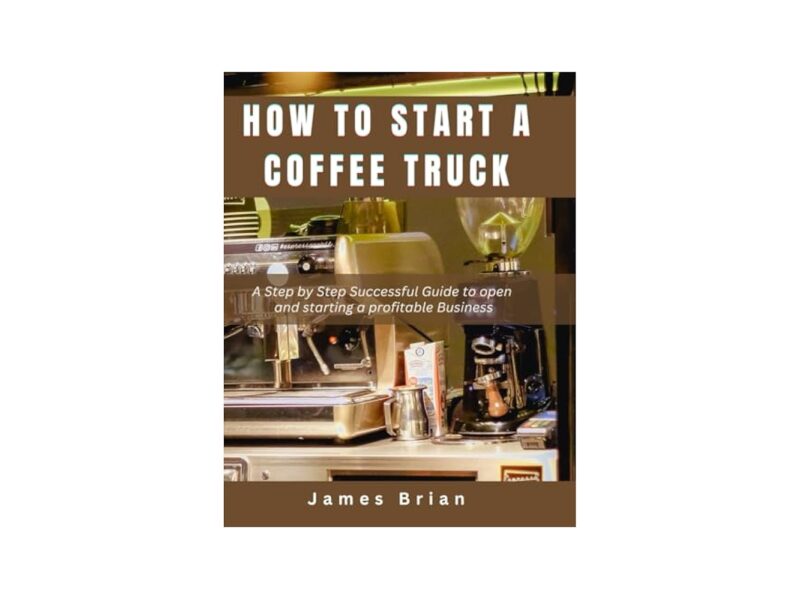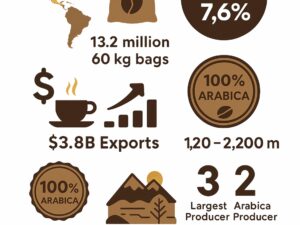Have you ever dreamed of turning your love for coffee into a thriving business? Starting a coffee truck could be the perfect way to bring your passion to life and serve fresh, delicious coffee wherever the crowd gathers.
But where do you begin? This guide will walk you through the exact steps you need to take to launch your own coffee truck successfully. By the end, you’ll feel confident and ready to make your coffee truck stand out and attract loyal customers.
Ready to brew your business idea into reality? Let’s get started!

Credit: perfectdailygrind.com
Choosing Your Coffee Truck Concept
Choosing your coffee truck concept is the first big step in starting your business. This choice shapes your menu, style, and customer experience. A clear concept helps your truck stand out in a busy market. It guides decisions about design, pricing, and location. Think about what makes your coffee truck unique and why people will visit.
Selecting Your Niche
Focus on a specific coffee style or theme. Options include organic coffee, espresso drinks, or specialty blends. Some trucks serve quick breakfast items with coffee. Others may offer vegan or gluten-free snacks. Choosing a niche helps attract loyal customers. It also simplifies your menu and operations.
Identifying Target Customers
Understand who will buy your coffee. Are they office workers, students, or event attendees? Consider their tastes, budget, and lifestyle. For example, office workers may want fast service and strong coffee. Students may prefer affordable options and cozy vibes. Knowing your customers shapes your menu and marketing.
Choosing A Brand Name
Select a name that is easy to remember and spell. It should reflect your coffee truck’s style and niche. Avoid complicated words or long phrases. A good name creates a strong first impression. Test it with friends or potential customers for feedback. Your brand name will appear on your truck, website, and social media.
Planning Your Coffee Truck Business
Planning your coffee truck business is the first step to success. It helps you understand what you need. Good planning saves money and time. It sets clear goals and directions. Careful planning builds a strong foundation.
Think about your target customers and location. Consider what makes your coffee truck special. Plan your menu and prices. Planning helps avoid surprises later.
Creating A Business Plan
Write a simple business plan. Describe your coffee truck idea clearly. Include your mission and goals. Show who your customers are. Explain how you will reach them. Detail your menu and pricing. Add your marketing ideas. A solid plan guides your daily actions.
Budgeting And Financing Options
Calculate all start-up costs. Include the truck, equipment, and supplies. Plan for fuel and maintenance costs. Don’t forget permits and insurance. List your monthly expenses too. Find ways to get money. Use savings or ask family and friends. Look for small business loans. Choose the best option for you.
Licenses And Permits
Check local laws for food trucks. You need a health permit to sell food. Get a business license to operate legally. Some cities require parking permits. Follow all safety and health rules. Keep your documents updated. Legal papers protect your business and customers.
Buying And Outfitting Your Truck
Buying and outfitting your coffee truck is a crucial step to start your business. The right truck and equipment help you serve customers quickly and keep your coffee fresh. This section covers how to find the perfect vehicle, what equipment you need, and how to design the truck’s interior for efficiency and comfort.
Finding The Right Vehicle
Choose a truck that fits your budget and business size. A used food truck can save money but check its condition carefully. Consider the truck’s size, engine, and storage space. Make sure it can handle all your coffee gear and supplies. Think about fuel efficiency for lower running costs. Check local laws for vehicle requirements and permits.
Essential Equipment And Supplies
Equip your truck with a reliable espresso machine and coffee grinder. A water system with a sink and storage tanks is necessary. Include a refrigerator for milk and other perishables. Stock cups, lids, napkins, and stirrers for serving customers. Use durable containers for coffee beans and syrups. Don’t forget cleaning supplies to keep everything sanitary.
Designing The Interior
Organize the space for easy movement and fast service. Place the espresso machine near the counter for quick access. Store supplies within arm’s reach to save time. Use shelves and cabinets to keep items tidy and secure. Add good lighting to improve visibility inside the truck. Choose materials that are easy to clean and maintain.
Crafting Your Coffee Menu
Crafting your coffee menu is a key step in starting a successful coffee truck. Your menu shapes what customers expect. It defines your style and sets you apart. A clear, simple menu draws more people. Focus on quality and variety that match your truck’s theme.
Think about what you want to offer. Classic favorites or bold new flavors? Keep your menu easy to read and understand. This helps customers decide quickly and keeps lines moving. A well-planned menu boosts sales and customer satisfaction.
Selecting Coffee Beans
Choose coffee beans that suit your brand. Offer fresh, high-quality beans for best taste. Try beans from different regions to add variety. Light, medium, or dark roast? Pick what fits your style. Keep supply consistent to avoid running out. Fresh beans attract loyal customers and keep them coming back.
Offering Specialty Drinks
Specialty drinks make your menu unique. Include popular options like lattes, cappuccinos, and mochas. Add seasonal drinks to excite customers. Use simple recipes to keep service fast. Offer dairy and non-dairy milk choices. Small touches like flavored syrups can enhance taste. Specialty drinks can boost your profits and customer interest.
Adding Food And Extras
Food items complement your coffee menu well. Offer pastries, cookies, or light snacks. Choose items that store well and are easy to serve. Extras like sugar, cream, and stirrers should be available. Keep packaging simple and eco-friendly. Food options increase sales and improve the customer experience.
Setting Up Operations
Setting up operations for your coffee truck is key to smooth daily work. This stage covers the core tasks to keep the business running well. Prepare to manage staff, supplies, and health rules.
Organizing these parts early will help you avoid problems later. Good operations make customers happy and keep your team motivated.
Hiring And Training Staff
Choose workers who enjoy coffee and customer service. Friendly and fast workers improve the customer experience. Train staff on brewing, serving, and handling money. Teach them how to use equipment safely. Practice clear communication and teamwork. Regular training keeps skills sharp and service consistent.
Managing Inventory
Track coffee beans, milk, cups, and other supplies closely. Buy only what you need to avoid waste. Use simple inventory systems to check stock daily. Order supplies before running low. Organize storage to keep items fresh and easy to find. Proper inventory saves money and prevents shortages during busy times.
Establishing Health And Safety Practices
Follow local health rules carefully to keep your business legal. Clean all equipment and surfaces regularly. Train staff on hygiene, like handwashing and safe food handling. Store food and drinks at correct temperatures. Use gloves and hairnets if required. Regular checks help avoid health problems and build customer trust.

Credit: usetorg.com
Marketing Your Coffee Truck
Marketing your coffee truck is key to attracting customers and growing your business. Effective marketing helps people know where to find you and why they should try your coffee. Use clear and simple strategies to reach a wide audience.
Building An Online Presence
Create a website for your coffee truck. Show your menu, location, and hours. Keep your website easy to use on phones and computers. Add photos of your coffee and truck to make it inviting. Use clear contact information so customers can reach you. Regularly update your site with news or special offers.
Using Social Media
Post regularly on social media platforms like Instagram and Facebook. Share pictures of your drinks and daily locations. Write short, friendly posts to engage your audience. Respond quickly to comments and messages. Use simple language and clear photos. Social media helps you stay connected and attract new customers.
Participating In Events And Festivals
Join local events and festivals to showcase your coffee truck. These places have many people who may become your customers. Offer samples or special deals to attract visitors. Bring eye-catching signs and decorations to stand out. Events help build your reputation and expand your customer base.
Finding Prime Locations
Finding the right location is key for a coffee truck’s success. The right spot brings more customers. It also helps build a steady income.
Consider places with lots of people. Look for areas where people stop or gather. The best spots make your truck easy to find and reach.
High-traffic Spots
Busy streets and crowded sidewalks work well. Near office buildings or schools are good options. People there often need a quick coffee break. Parks and public squares also attract many visitors. Choose spots visible from the main road.
Partnering With Local Businesses
Work with nearby shops or gyms to share space. They already have regular customers. A coffee truck nearby adds convenience for their clients. This partnership can bring loyal customers to your truck. It also helps reduce location costs.
Seasonal And Special Event Opportunities
Events like fairs, markets, and festivals draw many people. Setting up your truck at these events can boost sales. Seasonal spots near beaches or parks work well in summer. Plan to move your truck to these places during busy times. This keeps your business active all year.

Credit: ferlabikes.com
Scaling And Growing Your Business
Growing your coffee truck business takes smart planning and clear goals. Success starts with one truck, but expanding can bring more customers and profits. Focus on ways to grow steadily without losing quality or service.
Scaling means adding more trucks, exploring new business models, and offering new products. These steps help you reach more people and build a stronger brand. Careful growth ensures your coffee truck stays popular and profitable.
Expanding Your Fleet
Adding more trucks lets you serve different locations. Each new truck spreads your brand to new customers. Choose spots with high foot traffic or events to maximize sales. Train your team well to keep service fast and friendly. More trucks mean more sales but also more management work. Plan routes and schedules carefully for smooth operations.
Franchising Options
Franchising lets others run coffee trucks under your brand. You get fees while they handle daily work. This grows your business faster without needing all the staff. Create clear rules and training for franchisees. Protect your brand’s quality and reputation. Franchising requires good legal and financial planning. It can bring steady income and wider reach.
Diversifying Your Offerings
Adding new menu items attracts more customers. Offer snacks, pastries, or seasonal drinks. Healthy options or unique flavors can stand out. Test new products to see what sells best. Special promotions or combos can boost sales. Keep your core coffee drinks strong but add variety. This keeps customers interested and coming back.
Frequently Asked Questions
What Equipment Is Essential For A Coffee Truck?
Essential equipment includes an espresso machine, grinder, water supply, and refrigeration. You also need a cash register and storage for supplies. Quality tools ensure fast service and great coffee taste.
How Do I Choose The Best Location For A Coffee Truck?
Choose high-traffic areas like office parks, events, or college campuses. Check local regulations and permits. A good location boosts daily sales and builds a loyal customer base.
What Permits Are Required To Start A Coffee Truck?
You need health permits, food handler’s licenses, and a mobile vendor permit. Requirements vary by city and state. Always check with local authorities before operating.
How Much Does It Cost To Start A Coffee Truck?
Starting costs range from $50,000 to $100,000 depending on equipment and truck condition. Budget for permits, supplies, and marketing. Proper budgeting avoids unexpected financial hurdles.
Conclusion
Starting a coffee truck takes planning and hard work. Choose a good location and offer tasty drinks. Keep your truck clean and friendly to customers. Learn about permits and costs before you begin. Stay consistent and listen to customer feedback.
Small steps lead to steady growth. Enjoy serving coffee and meeting new people. Your passion will help your business succeed. Keep learning and improving every day. Success comes with patience and effort.







